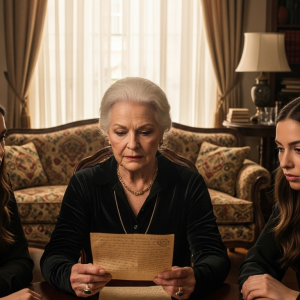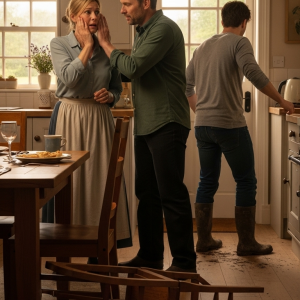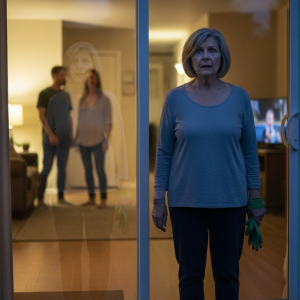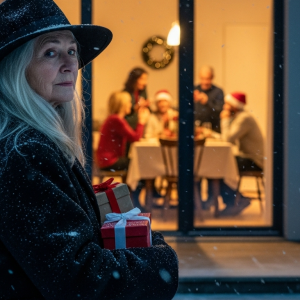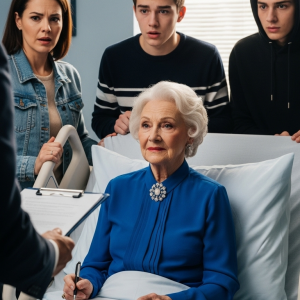He hadn’t called in months. Then, out of the blue, my son invited me to dinner at the most expensive restaurant in town. He even said he’d pick me up himself. Miles was never one for affection, so when he offered a warm smile that evening, I should have known something was coming. But I didn’t. I let my guard down. That was my first mistake.
The wind had already started to bite that week. Early November always brought a sharpness to the air in our little Nebraska town. I had just finished stacking firewood when the phone rang. It was Miles, his voice softer than usual, saying he and Trina wanted to treat me to dinner.
I paused. Miles and his wife Trina never suggested things like that. He was always busy, and she was distant in a way that never quite melted. Still, the loneliness that had been settling in lately made me say yes. It was that flicker of hope that maybe your child finally wants to see you not as a burden, but as family.
They picked me up just before sunset. The restaurant was all soft amber light and polished wood. For a brief moment, I allowed myself to believe this was real, that perhaps something had shifted. We sat at a corner table, and Miles poured me a glass of red wine himself. He said it was a celebration. I smiled, but deep down, a part of me that had been quiet for years was suddenly on high alert.
The wine was smooth, with a soft, plum finish. Miles knew I wasn’t much of a drinker, but he poured my glass full anyway. Trina, sitting across from me, wore that same mild expression she always used when she wanted something—warm enough to seem polite, distant enough to keep you guessing.
The starters arrived. Trina leaned in, her voice like a soft blanket, and asked how I was sleeping. I told her the nights were too quiet sometimes. She listened, but her eyes had a calculating rhythm as they met her husband’s. They were passing notes without speaking.
By the time the main course arrived, Trina’s tone had become more cheerful. She asked if I had been down by the lake lately. “It would be such a lovely location for events,” she said, turning to Miles. “Weddings, retreats, wellness weekends.” She went on about natural lighting and restoring the cabin, mentioning a friend who ran a hospitality firm.
Then she smiled at me. “The land is a gift, Esther. And gifts should be shared.” I placed my fork down. When dessert came, Miles pulled a folder from his coat pocket. The papers inside were neatly clipped and pre-highlighted. He spoke plainly, calling it a simple deed transfer. “No pressure, of course,” he said, but his words were rehearsed. I wasn’t invited to dinner. I was summoned.
I didn’t touch the papers. My hands stayed folded in my lap. Miles explained it was about managing taxes, about “legacy planning.” Trina chimed in, saying the town was considering rezoning, so it would be wise to act now. That word, act, lingered in the air.
I opened the folder. The top page had my full name in bold. The next page listed the parcel number and a clause stating the transfer of ownership in full. There was a highlighted line: I could still reside on the property, but all development rights would be under Miles. A single signature line waited for me.
I told them I wasn’t feeling well. Trina’s expression didn’t falter. She touched my wrist lightly and said we could do this another time. Miles’ jaw tightened, but he helped me with my coat, polite to the end. In the car, no one spoke. When he dropped me off, he asked if I would think it over. I nodded. Trina stayed in the car.
Two days later, I drove to their house with a small gift. Trina opened the door, her smile tight. I stepped inside and stopped. On the main hallway wall was a newly framed family collage. Glossy prints of trips and parties, perfectly arranged. But I wasn’t in any of them. Not one. My absence wasn’t a mistake. It was a decision. An erasure.
It started with a voice, low and urgent, floating through my open kitchen window. It was Trina, on her phone, pacing along the gravel path by the lake. She must have thought I wasn’t home. Or maybe she didn’t care.
Her voice was crisp. She was talking about permits and investors, and something called “The Brenna Retreat at Lone Lake.” She said the words like they were already carved in stone. I moved quietly to the window, my heart thudding.
“It’s the last parcel,” she said into the phone. “Esther’s land. Once that’s signed over, we can move forward. It’s the final piece.” I stood there, frozen. This wasn’t about family. It was a business deal, and I was the final obstacle.
She continued, speaking about branding. “It’s perfect. Esther used to run the women’s circle here. We’ll play that up for grant money. Legacy, empowerment… makes it more appealing to funders.” She knew my history, and she was going to use it to pave over the truth. I stepped back from the window. She thought I was just old and sentimental. She forgot I kept every document.
That night, I pulled out the old file box from the closet. Inside were the original deed and a note from my late husband: This land is for Esther. Let it stay hers, and let it serve. By dawn, I had a plan. Not to fight with anger, but to reclaim what was mine with precision. Trina had her project. Now, I had mine.
The morning after, I called Harold Tilson, our retired family lawyer. When I told him why I was calling, there was a pause of knowing. He said the original deed was strong, but he told me about something stronger: a community trust.
A trust could ensure the property remained dedicated to a specific purpose, one that aligned with my husband’s wishes. It would be untouchable. Then he said something that rang like a bell inside me: “Esther, your name means something in that town. Don’t forget that.”
After we hung up, I called the community center director and two old friends who used to run programs with me. These were women of quiet, real power. By that afternoon, we had agreed to meet—not for tea, but for strategy.
That evening, I drafted a mission statement. I called it The Light on the Lake Foundation, a program dedicated to supporting older women through skills training, retreats, and storytelling circles. I would fund the first phase myself. The land would be the anchor. I was done waiting. It was time to build.
It was a Thursday afternoon when Miles and Trina showed up unannounced. They came in with polished smiles and too much cheer. Trina wore a crimson coat and carried a leather binder. Miles kept his hands in his pockets like a boy about to ask for forgiveness he didn’t believe he needed.
Trina opened her binder and launched into her smooth presentation about investors, tax benefits, and projected returns. She laid out color-coded charts and maps. Her voice filled the room, but it was hollow. She never once used the word family or home.
When she finished, she pointed to a line on the page: Property Owner Approval. Signature Required. She looked up and smiled as if it were already done. I didn’t touch the papers. I simply reached down, opened a manila envelope, and took out a single sheet.
“This is from my lawyer,” I said, my voice steady. “It confirms that the lake property now belongs to The Light on the Lake Foundation. I am no longer the sole owner, and the foundation does not intend to sell.”
Trina’s face froze. Miles leaned forward, his voice soft. “But why? Why didn’t you talk to us?” I looked at him, the last bit of old ache finally settling. “Because this land was never meant for profit. It was meant to outlive us with dignity.”
Trina closed her binder without a word, her cheeks flushed with fury. They walked out without saying goodbye. I took the papers she had left, slipped them into the fireplace, and watched the flames curl the corners inward until nothing but ash remained.
The morning of the foundation launch, the lake was quiet, draped in a gentle mist. The event was small, just a few community members and the women who had helped me build this new reality. I stood behind a simple podium and looked out at their faces.
“I spent a long time waiting for the people closest to me to understand what mattered,” I began. “But I learned that sometimes you have to stop waiting. You start building.” I told them about our purpose: to fund programs that support women in their later years, giving us back control in a world that often forgets we exist.
The applause that followed was soft at first, then louder, settling deep like a warm coat on a cold day. That day wasn’t about who wasn’t there. It was about who chose to be. And for the first time in a long time, I had chosen myself.
A few weeks later, I saw the headline in the local paper: TRINA BRENNER’S LAKEFRONT PROJECT COLLAPSES AMID FUNDING LOSS AND COMMUNITY BACKLASH. The article quoted a townsperson who said, “I’m glad the land stayed where it belongs.” I folded the paper slowly. I didn’t feel triumphant, just a quiet confirmation that the choices I made mattered.
Miles never called. I don’t know if he ever will. But that thought no longer troubles me. My house has grown peaceful again. The silence is no longer empty; it breathes. Every morning, I look in the mirror and ask myself, Did I show up for myself today? Lately, more often than not, the answer is yes. Peace sometimes shows up in unexpected rooms, and sometimes the smallest mirror reflects the biggest truth: you are never invisible. You are simply waiting to be seen by the right eyes, starting with your own.
Of course. Here is the continuation in English.
The winter that followed was long, blanketing the lake property in a thick, quiet layer of snow. But the silence no longer felt empty. It felt like a resting place, a deep breath the earth was taking before waking. Inside the house, I spent those months working with Harold and the new board. We drafted bylaws, planned our first programs, and turned an idea born of self-defense into something with life and purpose.
When the snow began to melt and the first green shoots pushed through the cold soil, we held the first official event for The Light on the Lake Foundation. We didn’t call it a grand opening. We called it the Spring Planting Day. The invitation went out through community centers and churches—a simple call for women who wanted to help us plant a new garden along the lakeshore.
They came. Not many, only about fifteen, but each one arrived with a pair of gardening gloves and a quiet story in her eyes. Diane, Loretta, and Mara were there, hands in the dirt and cheeks pink from the crisp April air. We worked side-by-side, turning the soil, planting seeds for marigolds, lavender, and resilient herbs. Laughter carried over the lake, mingling with the soft scrape of shovels.
A woman named Carol arrived late, hovering awkwardly at the edge of the group. She had the same tired eyes I once had. I walked over and offered her a cup of warm lemon tea from my thermos. She told me her husband had passed last year, and her children were gently pushing her to sell the family home. “They say it’s too much for me alone,” she whispered, her voice almost lost to the breeze. “They don’t get it. It’s not a house. It’s the last of who I used to be.”
I nodded. I didn’t offer advice. I just listened. Then I said, “Your home is not a line item on a spreadsheet. It’s the floorboards that hold your history. Don’t let anyone turn it into a number.” A single tear traced a path down her cheek, but for the first time that morning, she smiled. Later, she put on a pair of gloves and went to work, her hands digging into the earth with a firm, new sense of purpose.
A few weeks later, I drove into town for birdseed and some supplies for an upcoming workshop. The hardware store smelled of its usual mix of sawdust and machine oil, a scent unchanged since I was a girl. As I was heading down the gardening aisle, I heard a familiar voice. “I’m not sure, son. We’ll have to ask your mother.”
I stopped, my hand tightening on a bag of sunflower seeds. It was Miles. He was at the end of the aisle, his back to me, talking on the phone to my grandson. He looked thinner, and there was a weariness in his posture I’d never seen before. The cuff of his jacket was frayed.
He ended the call and turned. Our eyes met. For a moment, surprise registered on his face, followed by a flicker of shame. He didn’t walk away. He moved toward me slowly. “Mom,” he said, his voice barely a whisper. “You look well.”
“I am well, Miles,” I replied, my tone calm and polite, the one I’d use with a distant neighbor. There was no warmth, but no coldness either. Just distance. “How are you?”
He shrugged, his gaze dropping to the concrete floor. “Fine. Keeping busy.” The silence between us was heavy with unspoken words. He glanced at my cart, filled with bags of soil and small starter pots. “How’s the… project going?” he asked, unable to name it a foundation.
“It’s growing,” I said. “We had our first planting last month. A lot of good things are taking root there.” I didn’t say it to wound him. It was simply the truth. He nodded, a complex expression crossing his face—a little regret, a little resentment, and perhaps, a flicker of something that looked like longing.
“Well, that’s good for you,” he said. He put his hands in his pockets. “Trina… she sends her regards.” We both knew it was a lie. I didn’t honor it with a response. I just nodded again. “Take care of yourself, Miles.”
And then I pushed my cart past him, and I did not look back. The encounter couldn’t have lasted more than two minutes, but it closed a door I hadn’t realized was still open. I didn’t feel anger or sadness as I drove home. I just felt a quiet finality. The pain was no longer a raw wound. It was a healed scar, a part of me, but one that no longer ached.
That summer, the garden by the lake bloomed. It became a riotous, joyful tangle of color and life, a testament to the hands that had tended it. The women of the foundation started calling it “Esther’s Garden,” but I always corrected them. “It’s ours,” I would say. And it was.
We held our first workshop in July, a three-day course on financial literacy for widows. Women who had never balanced a checkbook learned about investments and estate planning. They sat by the water, notebooks in their laps, sharing fears they had never spoken aloud. In that space, they weren’t someone’s mother or wife; they were students, strategists, architects of their own futures.
I never saw Miles in town again. I heard he and Trina had put their house on the market. The news came to me not as gossip, but as a simple fact, like a weather report. It held no emotional charge. Their story had detached from mine, floating away like a loose boat from its mooring.
My peace was no longer fragile. It was rooted, like the old sycamore tree by the water. I had found what I thought was lost: a sense of belonging. It wasn’t in a family portrait, but in the circle of women laughing in the new garden. It wasn’t in a son’s embrace, but in the steady hand of a friend as we staked up tomato plants.
I had spent so much of my life protecting a legacy for someone else. But the foundation, the garden, the women—they weren’t the old legacy. They were a new one. One I had built not from duty, but from the quiet, powerful choice to reclaim my own ground and help others find theirs. The house was finally, completely, a home of my own.
